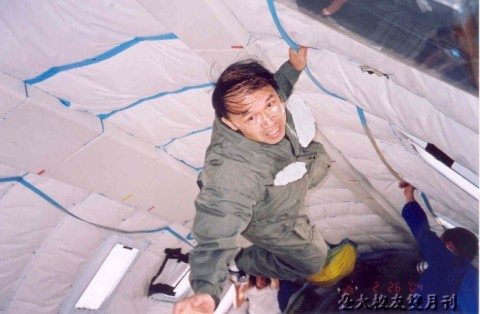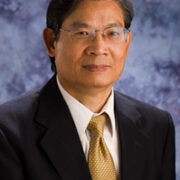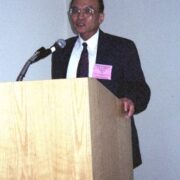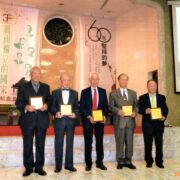From Royal Palm Boulevard to Space Center Houston
By Mike Kuo 郭正光
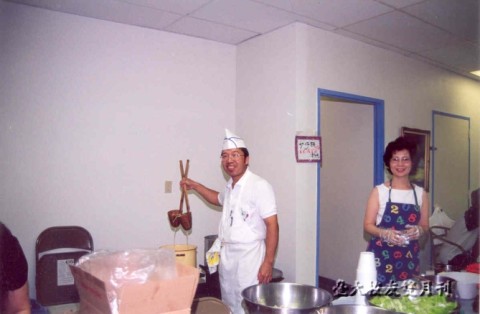
For many years I never reflected on my university life. Then, in September of last year (2009) I received a notification from the National Taiwan University (NTU) Track and Field Alumni Association for a 60-year anniversary team celebration, inviting alumni abroad to join for this grand event. That letter led me to reminiscing of events 40 years past, and after brief consideration, I decided to return to Taiwan to participate. In that year, I encountered team members I had not seen for decades; I also met chief editor Lin of NTU Bimonthly Alumni Magazine. She invited me to write for the magazine, and I was too polite to refuse, so I nodded in agreement. Back in the U.S., I thought that as time passed, she would forget my promise – there were thousands of outstanding NTU alumni in the U.S. after all, so it shouldn’t come down to me to write. I didn’t expect her persistence; she sent me repeated e-mails saying that few overseas alumni submitted articles. This was a request impossible to refuse, so I finally set pen to paper. I do not have any great deeds to narrate, but I hope that by putting myself out there, more remarkable overseas alumni will contribute to the NTU alumni magazine in the future.
Entering NTU was the first-choice school for nearly everyone. I had two elder brothers who were already at NTU and a little sister who was a talented student at the prestigious Taipei Frist Girl’s High School – you can imagine the pressure I faced. It was an anomaly that I tested into NTU, for considering my high school grades and the results of my last mock test, I should be about the level of Pingtung School of Agriculture (now called Pingtung University of Science and Technology). After all, I spent my final year of high school running around the track field, and I was busy chasing girls at parties. Yet this surprising anomaly ordained my career over the following decades.
To be honest, I was only one point above the minimum for admission to NTU Department of Agricultural Extension. Had I tested two points lower, I would likely be an alumnus of China Medical University. Once I got into the Department of Agricultural Extension, I was very determined to be a good student at first; before school started I bought the English versions of textbooks for general chemistry and botany and read them at home, looking up unfamiliar words in the dictionary. After a laborious two or three weeks, I finished the first chapter, “introduction,” only to have the teacher cover that section in just 5 minutes – my effort was wasted. It wasn’t long before notions of retesting or transferring departments started circulating in my brain, because it seemed the only career for an agricultural extension graduate was being a marketer for a Farmer’s Association, a job my mother was doing at the time. I thought about my final year of high school when my classmates and I called each other “Dr. Chen,” “Dr. Kuo,”and “Dr. Wang.” Everyone at the time wanted to study science, but my sense of surprise and pride at admission to NTU had diluted my wish to retake the admissions test to become a doctor. My colorful freshman life annihilated my grades beyond the degree possible to transfer to the Department of Agricultural Chemistry. Then, the last month of freshman year, I finally resolved myself to simultaneously prepare to retest and apply to transfer to the Department of Agronomy. In the end I was accepted into the Department of Agronomy but was not admitted into any medical institutes whatsoever.
Going to medical school was not only my true dream, it was also my father’s wish. Yet by my sophomore year I had set aside any delusions of going to medical school. Then one day my father said he wanted me to go to Japan to study medicine and told me to study Japanese. There were certainly some people who took this path to become doctors, but it was very expensive; it cost about 10 million NTD, a sum which at the time could buy a decent house in Taipei. With this option for going to Japan open, on top of boring professors who taught by reading handouts they had not changed in 10 years, I started to not take the agronomy department curriculum seriously. The worst class was the required class on “agrometeorology”- with professor absences and my habit of sleeping in class, it seemed like I didn’t learn anything all semester. To this day all I remember is the professor saying, “If you get up in the morning and see thick fog, it will not rain that day,” with a thick mainland accent. No wonder the weather report those days was always: “partly cloudy with occasional showers.”
Our class of the Department of Agronomy had more local girls than boys – there were only five boys. As some of the agricultural internship classes involved working in the field, us boys used the opportunity to barter tough labor for notes. I admired how earnestly, quickly, and neatly those girls took notes. Without their notes, I certainly would have failed several classes. Those four boys were all very successful later on; Rongmu Liu 劉榮木 became a famous professor at the University of Illinois, for example, Hsiantsung Tsai 蔡憲宗became President of DuPont Taiwan, and Chiyuan Yang 楊之遠became Deputy Director of the Environmental Protection Agency in Taiwan and a professor of Chinese Culture University. As for the girls, I have lost contact with most of them and don’t know their situation. The overseas students have become even more distant.
Because I wasn’t studying very hard and was spending all my time with after-school clubs, track and field, and girlfriends, I didn’t interact much with classmates from my own class, nor did I cultivate those relationships. This is one of my main regrets. When I convene with my classmates in Taiwan over the years, I can hardly recall any shared memories. On the other hand, because I spent so much time on the track and even served as team captain, my relationships to my former teammates are closer and we have more shared memories. Besides track and field, I was also active in the student government and the magazine NTU Youth. There I met the former Taiwan president Ma Ying-jeou 馬英九and former chairman of China Development Financial Mr Tingwu Hu 胡定吾. Interestingly, those who I worked with in these student organizations became “enemies” after I went abroad. I participated in pro-Taiwan independence organizations and became an “insurgent.” They participated in coalitions aiming to take over mainland China and became “patriots.” This development was truly beyond my expectations. My experience at the student government and NTU Youth magazine not only cultivated my enthusiasm for participating in various organizations in the U.S. and strengthened my leadership skills, but also trained me as a writer. While in the U.S. I have served as the president of various Taiwanese organizations, and I wrote the special column for the pro-Taiwan independence magazine the Taiwan Gazette.
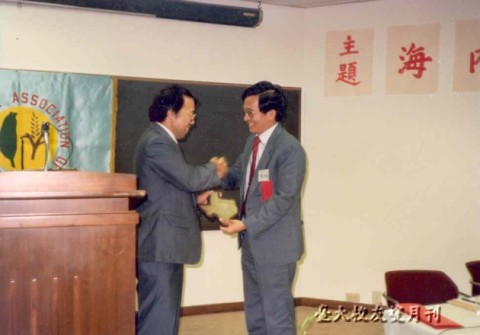
I was a third-year student by the time I started to take my agronomy classes seriously. It wasn’t because I had some grand revelation, but because there was a drastic change in my family: my father trusted a sworn brother of his and loaned all his savings to him, including he and my mother’s retirement funds. He even borrowed money from friends and the bank in the friend’s place. What a shock when the business failed – not only did my father lose his life’s savings, he also now owed the bank and friends a lump of money. Because of this, our house was under investigation by the bank. Moreover, my dream of studying medicine in Japan was now ultimately shattered. I had to face the reality and the future. I started to become a serious agronomy student and interact more with my classmates. I even developed serious interest for the courses in my major, like genetics, breeding, plant physiology, and biochemistry. On my report card it was no longer just PE that got a high mark of 90. In my senior year, there were two professors who had gotten there doctoral degrees in the U.S. in our department; perhaps it was due to our habit of venerating the West, but it made us open up our eyes. During my first three years in college I had never borrowed a book from the library or looked up material to write reports. When I went to the library it was only to do homework and check out pretty girls on the side. But these two professors made us read English journals and look up materials for our reports. The second semester of my senior year I had the fortune of being hired as a research assistant by one of these professors, researching how to increase production volume of sweet potatoes. It was a shame that after just one semester I graduated and went into mandatory military service. Yet this one year of academic experience set my resolve to study abroad once I finished military service. After being released, I returned to NTU to be a research assistant for professor Chungben Bi 畢中本, researching how to increase breeding speed with organized cultivation. Before our research succeeded, I was already abroad.
Because my family’s economic situation was insecure due to my father being sent into debt, I knew I would have to rely on my own part time work for a living. I had heard that in the U.S. it paid better to work as a cook in a restaurant than as a waiter. So, I used my connections and for three to four months before I went abroad, I biked from NTU to Hongshi restaurant on Zhongshan N. Rd. every day after work to learn culinary arts. Not only did I earn my tuition and living expenses for the first two years in the U.S., I also earned myself the nickname “Chef Kuo.”While I was studying at Texas A&M University, I got a couple other students to participate in an international student cooking competition, earning a victory for the Taiwanese Student Association. When I worked at Space Center Houston, I started a Chinese cooking class in the city center in my spare time and taught hundreds of Westerners how to make Chinese food. I also helped two food companies to develop Chinese flavors, adding to the Chinese-food menu options for astronauts. Someone once said I am perhaps the only chef who has a Ph.D. in nutrition.
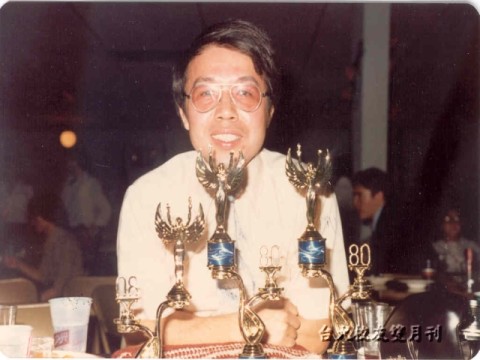
I originally wanted to come the U.S. to study genetics, but a classmate of mine said there were few scholarships in that field, so after prolonged contemplation I decided to change to food science, and concentrated on processing of agricultural crops. This knowledge was not learned in vain. The first two years were very tough – my English was not good, not to mention working though the Texan English of some professors. And on weekends I had to work. It was a difficult time, but the most difficult thing was writing my master’s thesis. I spent months working on a thesis draft that I was proud of. My advisor returned the draft to me the next day. I thought I had passed, until I looked closer and saw the large red letters written on the cover: “Mike, please write that in English.” My thesis was written in English. So, in an unconvincing rebuttal to my professor’s theory I said, “I wrote in English.” Do you know what the professor said? He said, “That is your English, not my English.” To this day I am embarrassed by his response. In the end I had to spend money to get someone to correct it and type it out and force my way towards graduation, otherwise my marriage would have been blown off as well. I had a scholarship for my doctoral degree, and later I received a grant for a three-year project from the National Science Foundation. This enabled me to hire research assistants to look up materials and do experiments – I was primarily responsible for writing and presenting the dissertation. My advisor was Korean, and his English was not much more elegant than mine, so I sent in my writings after only minimal corrections and my dissertation passed inspection in a breeze.
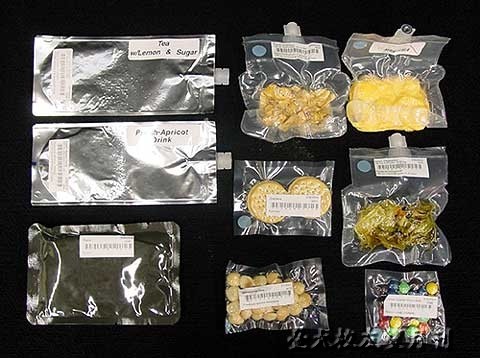
After graduating, I thought of returning to Taiwan to teach, but my applications all got lost at sea. Later, I found out I was on the government’s “blacklist” and could not return to Taiwan. My only option was to stay in the States and look for work. At the time, Space Center Houston was putting a lot of effort into developing space food and wanted to establish a food analysis lab. With my double experience in food science and cooking I was soon hired; I never thought I would be here for 30 years. I have given my life’s energy and studies to the U.S., and haven’t put in an ounce of effort for the Taiwan which birthed me and raised me. This is my deepest regret in life. The comforting thing is that being on the blacklist led me to breach through to Taiwan in 1991 and break the controlling hold of the blacklist. Because of our efforts, starting in 1992, “insurgent” became a historical term. To this day I have never regretted the 15 years I could not go back to Taiwan before that.
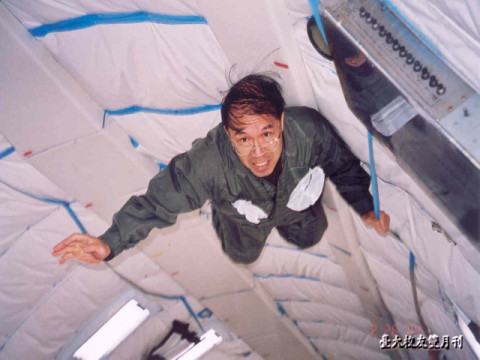
Source: NTU Alumni Bimonthly Magazine, Oct 15th, 2010 | 72nd edition
Translated from: 319. 從椰林大道到休士頓太空中心 / 郭正光 /2015/08 by T.A. Archives
Posted 1/30/2021

